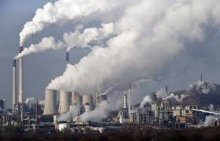Environmental Issues Caused
Ecological succession is the abrupt changes in the condition of the environment to which organism needs to adapt in order to survive. Some of these changes are fast and vicious that cause vast extinction of diverse organism in the biosphere. These “drastic changes” are the cause why some plants and animals suffer great loss in number and might end up to extinction of the whole specie. Some of these drastic changes are natural phenomenon such as:
a. Earthquakes
b. Volcanic eruptions
c. Landslide and cave-ins
d. Floods
e. Pollution
These natural changes are somewhat out-of-control by people and mostly brought about by disastrous natural calamities in the biosphere. A natural calamity such as volcanic eruption can wipe-out plant and animal population in an area, an ecological succession slowly takes place until finally the dilapidated area is brought back to life. People do have control over the changes in the biosphere which are brought about by their activities.
Water Pollution
This is the contamination of streams, lakes, underground water, bays, seas and oceans by substances that is harmful to living things. This commonly occurs in industrialized countries all over the world just like air pollution. The famous Rhine River which cuts through several countries from Austria to West Germany has been known as “Europe’s largest open sewage system.”
Marine biologist will forever sadly remember the worst oil spill in the United States which occurred in Valdez, Alaska in 1989. The Exxon Valdez tanker spilled over 41 million liters of oil which killed thousands of marine organism in the waters of Valdez.
In the Philippines, five major river systems in Metro Manila and practically all rivers in highly industrialized cities like Cebu, Iloilo, Baguio and Davao are already biologically dead.
In solving this problem you must consider the major sources of pollutants in your community. Some of the causes of water pollution are:
- Improper waste disposal by industries and even household
- Additional harmful substance in water
Water pollution does not only greatly reduce marine vegetation and animal life along the coastline, it is also contributes to the destruction of aquatic ecosystem like coral reefs and mangroves.
Air Pollution
This is a condition where additional vile substances in the atmosphere are added that may results to damage environment, human health and the quality of life. It is caused by human activities inside homes, schools, offices, industries and cities that can spread across continent and even globally.
Air pollution is a serious problem in many countries in this era of industrialization. It is true that industrialization is a means to achieve better socioeconomic conditions. But it is also a fact that industrialization is accompanied by problems which endanger the health of the people and the lives of plants and animals.
The term smog refers to the mass of smoke or fumes containing poisonous gases and particles of various industrial wastes that blackens the horizons of a highly polluted are. Smog comes from the exhaust pipes of vehicles and from the chimneys of factories.
Smog’s travels far and wide from its sources. Noxious gases and particulates these are small solid particles in the air released from steel and chemical plants of West Germany have been carried to as far as London, Copenhagen and Stockholm, a radius of more or less 150 kilometers. Look at the map of Europe and locate these cities.
In the Philippines, pedestrians often run into black fumes from the smoke-belching vehicles are crowded cities, whilst motorists in the suburbs see a layer of smog hanging low in the horizon of the Greater Manila Area. Recent high death rates of chickens in many poultries of Bulacan and of ducks in the towns of Pateros, Taguig and Pasig have been traced to air pollution. Sturdy plants which are used to beautify street islands and sidewalks can hardly survive in the toxic content of the air in the metropolis.
Forest Denudation
This is a phenomenon where forest soil is strip by erosion or weathering. It is also known that tropical rain forest is the most diverse terrestrial ecosystem on earth. But it only covers less than 10% of the earth’s surface; they contain more than half of the species of organism documented worldwide.
The Philippines economy and ecology are greatly dependent on this rich ecosystem. The forest provides renewable sources of food, fiber, medicine, lumber and other wood products which keep our economy alive. They also serve many ecological functions that help conserve soil and water; replenish oxygen supply and reduce carbon dioxide in the air.











